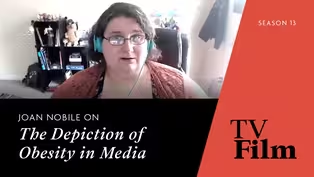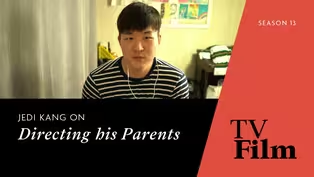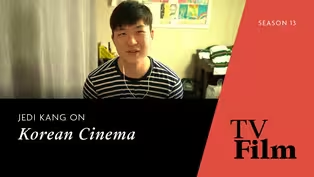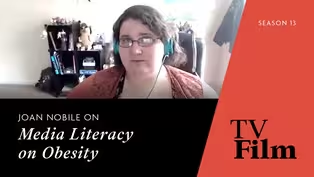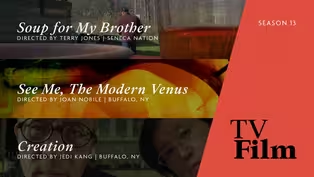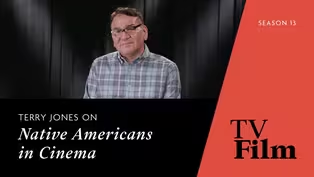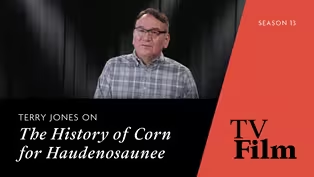TvFilm
Soup for My Brother | See Me, The Modern Venus | Creation
Season 13 Episode 2 | 28m 45sVideo has Closed Captions
Short films about tradition, love, loss, the stigma of weight, and the creative process.
Join our host Amani Olugbala to watch three short films this week. “Soup for My Brother” from Seneca Nation filmmaker Terry Jones is a short documentary about tradition, brotherly love, and loss. “See Me, The Modern Venus” from filmmaker Joan Nobile, explores the personal and social stigma of weight. Finally, “Creation” from filmmaker Jedi Kang is a comedic short about the creative process.
Problems playing video? | Closed Captioning Feedback
Problems playing video? | Closed Captioning Feedback
TvFilm is a local public television program presented by WMHT
TvFILM is made possible by the New York State Council on the Arts with the support of Governor Andrew Cuomo and the New York State Legislature.
TvFilm
Soup for My Brother | See Me, The Modern Venus | Creation
Season 13 Episode 2 | 28m 45sVideo has Closed Captions
Join our host Amani Olugbala to watch three short films this week. “Soup for My Brother” from Seneca Nation filmmaker Terry Jones is a short documentary about tradition, brotherly love, and loss. “See Me, The Modern Venus” from filmmaker Joan Nobile, explores the personal and social stigma of weight. Finally, “Creation” from filmmaker Jedi Kang is a comedic short about the creative process.
Problems playing video? | Closed Captioning Feedback
How to Watch TvFilm
TvFilm is available to stream on pbs.org and the free PBS App, available on iPhone, Apple TV, Android TV, Android smartphones, Amazon Fire TV, Amazon Fire Tablet, Roku, Samsung Smart TV, and Vizio.
Providing Support for PBS.org
Learn Moreabout PBS online sponsorship- Welcome to TVFilm.
I'm Amani Olugbala.
TVFilm showcases the talents of upstate New York media makers across all genres.
In this episode, you will see three short films.
Each connected by a through line of deeply felt and personal storytelling.
The first film is a short documentary about tradition, brotherly love, and loss by filmmaker Terry Jones- "Soup For My Brother".
- I'm a member of the Seneca Nation of Indians, and we're located in Western New York.
Sometimes I feel like the story finds me and I find a way to tell it.
With "Soup For My Brother", it was, you know, bits and pieces of stories that my dad had told me during my life.
You know, he would tell me the story and then I would go and I would try to put it down in words and then he would correct me and says, "well I wouldn't say it like that."
But the collaboration with my father that allowed me to accentuate certain things that were particularly him.
My dad's on the homestead.
He's listening to a recording of his grandfather's voice during the Thanksgiving address.
And then he's talking about his brother, but there's something about all of that encompassing a place, a certain time.
So it was a matter of me like, how do I take the theory of filmmaking and apply it into my own life experiences, my own culture, my own, you know, the Seneca history, Iroquois or Haudenosaunee history.
- Today I'm making some soup for my brother.
(rustling) This land belonged to my grandfather, Solon Jones.
Now it belongs to my brother, Danny.
Today is an important day for my brother and I brought some things to make me remember.
Me and a bunch of old-timers.
There's only a couple of us left.
This is my grandfather, Solon.
He used to be a speaker in our Longhouse.
Here, he's reciting our Thanksgiving address and give thanks to the Creator for all we have.
I'm reminded of my grandfather, Solon.
When I was 12 years old, my brother and I stole his butcher knife.
He asked us, "Where's my knife?"
We were afraid of him because of the way he was.
So we ran into the woods.
Somehow, we broke off part of the blade.
So we stabbed that broken knife into a tree.
57 years later, the knife is still in that tree.
My grandfather never did find his butcher knife.
(man reciting in foreign language) My grandfather taught us about Indian medicine.
This is sassafras.
Sassafras purifies the blood.
Be careful, too much and you can damage your liver.
This is me, a couple years before I stole that knife.
That's my ma, on the right, and her two sisters.
They're all gone now.
This is me and 8 of my 13 brothers and sisters.
My brother Danny is on the left.
This is Danny's backhoe.
He bought it just before he got sick.
He was in and out of the hospital for weeks.
He has stomach problems.
One day, while in the hospital, he left me this message: - Hey Jim.
I made it back to the hospital.
It looks like everything is going to be okay.
It was my liver, caused by the antibiotic.
That was malfunctioning.
I guess it looks good.
Everything looks good.
Okay, I'll talk to you later.
- Everything wasn't okay.
My brother passed away shortly after that call.
My brother passed away one year ago today.
His spirit has been on a year's journey, visiting the places that were important to him.
And today, his travels end.
He will join all the others that have passed on before us.
And so I made some roast corn soup for my brother Danny.
In our language, we don't have a word for "goodbye", only "until I see you again."
Ësgö:gë'ae' Danny.
- In our next film, emerging artist Joan Nobile offers an exploratory look into the personal and social stigma of weight- "See me, the modern Venus."
- So I wanted to explore the mental health and social ramifications of being plus-sized, obese, fat.
Whatever you want to call it.
We're conditioned through the media and through our culture to treat fat people as the other.
So for me, that was the big thing that I wanted to challenge, was, fat people are as deserving of humanity as anybody else.
And we don't often get that, strictly due to our appearance.
And this is obviously a subject that a lot of people aren't necessarily comfortable discussing, but the two people that did answer were, were very keen to discuss.
I don't think the piece would have been strong without their input or their previous experiences.
It was both such a joy and in a way, kind of heartbreaking to hear their experiences and to layer it with the images.
Turning to re contextualize the body, through the winds of people who live inside that body.
So I wanted the title to kind of be in your face and go see me, this is my body, this is the modern Venus.
This is a body that is just as worthy of looking at as anybody else's.
- Why haven't you had weight loss surgery yet?
Fat bitch.
He called me into his office and was angry with me and said, "why are you so fat?"
"Why haven't you done weight loss surgery?"
"How did you let yourself get like this?"
- I look at myself and I'm just like, "wow, you look horrible."
- I don't understand why they don't just help us as if we're people.
It's like we're a different classification just because we're overweight.
It's something that sticks in your head.
- A lot of the time, it's myself saying mean things to me over other people saying mean things to me.
Which is a whole other level of, you know, discrimination against yourself, I guess.
I look at myself in the mirror, and I'm just like, "can I just take parts of you off?"
Temporarily just like, plop my chest off, plop some of my stomach off, just like put it off to the side, and then like be able to look at myself without that.
And I just kind of think about myself like, oh this is what it'd be like without that.
- It's just like, well, if I lose weight will I actually be happy?
I think that people who dislike overweight people see it as, well they did it to themselves and it's their own fault.
So instead of, I feel like they almost look at us like drug addicts.
Who have chosen to do these bad things, put these bad things in their body.
And now we're facing the consequences.
And in a way I get it.
But, drugs you don't need.
Food, you need.
It is literally the hardest addiction to break because you can not live without it.
It's not like drugs or alcohol that you can just quit and never touch again.
You have to eat to live and people don't see it that way.
They just see, "oh, you're fat."
Turned around and just said something about my weight and the whole class, the entire class, burst out into laughter.
And I ran out of the classroom, crying, and the teacher actually said that I had left class and tried to write me up for it.
- We're torturing ourselves because we need to feel like we're a part of society's model that just isn't, I won't say isn't achievable, but naturally, if you're not born in like petite small body, it's harder to try to achieve that when society just wants that.
- Okay so, hearing those things all the time really makes you feel like maybe you're not good enough.
And it's really hard because why is being fat the worst thing you can be?
- The third film is about the struggles of creative people everywhere.
Buffalo, New York based filmmaker Jedi Kang made this film, "Creation", in his family's home in South Korea while on lockdown, during the COVID-19 pandemic.
- Park, he's a South Korean director.
He's like a personal hero of mine.
Film "Oldboy" was probably my biggest inspiration.
I watched it like eight times in the making of this film.
Man gets kidnapped and, he gets put in a room for 15 years and gets fed like, dumplings.
I thought the situation of like being locked in a room was kind of like my situation with like the Corona situation of me being in Korea and like, not really knowing anyone here.
I don't think my acting's great at all but, like I just wanted to make a narrative film really bad and I just wanted to do it.
I wanted to make a film, but I couldn't make a film.
So this is a film about not me being not able to make a film.
(machine whirring) (beeping) (man beatboxing) (men shouting) (piano music) (bell ringing) (man speaking in foreign language) (piano music) (man speaking in foreign language) (piano music in background) (piano music) (woman speaking in foreign language) (bell chiming) (bell chiming) (man speaking in foreign language) (bell chiming) (man speaking in foreign language) (woman speaking in foreign language) (bell chiming) (machine whirring) (bell chiming) (bell chiming) (door slamming) (man beatboxing) (men shouting) (door slams) (door slams) (man beatboxing) - Learn more about the films and filmmakers in this season of TVFilm at wmht.org/tvfilm and be sure to connect with WMHT on social media.
I'm Amani Olugbala.
(intense drumming) TVFilm is made possible by the New York State Council on the Arts, with the support of Governor Andrew Cuomo and the New York State legislature.
Interview | Joan Nobile: Visual Approach
Video has Closed Captions
Clip: S13 Ep2 | 2m 5s | Filmmaker Joan Nobile talks about enjoying error and challenging cultural stereotypes. (2m 5s)
Jedi Kang on Directing His Parents
Video has Closed Captions
Clip: S13 Ep2 | 51s | Filmmaker Jedi Kang discusses working with his parents as actors in his films. (51s)
Video has Closed Captions
Clip: S13 Ep2 | 1m 33s | Filmmaker Jedi Kang discusses influences for his work. (1m 33s)
Joan Nobile on Media Literacy on Obesity
Video has Closed Captions
Clip: S13 Ep2 | 2m 12s | Indie filmmaker Joan Nobile talks about how obese people are shown in western media. (2m 12s)
Soup for My Brother | See Me, The Modern Venus | Creation
Video has Closed Captions
Preview: S13 Ep2 | 30s | Short films about tradition, love, loss, the stigma of weight, and the creative process. (30s)
Terry Jones on Native Americans on Cinema
Video has Closed Captions
Clip: S13 Ep2 | 2m 30s | Filmmaker Terry Jones discusses the lack of representation of indigenous people in media. (2m 30s)
Terry Jones on the History of White Corn for Haudenosaunee
Video has Closed Captions
Clip: S13 Ep2 | 1m 39s | Terry Jones talks about the history and significance of burning corn. (1m 39s)
Providing Support for PBS.org
Learn Moreabout PBS online sponsorshipSupport for PBS provided by:
TvFilm is a local public television program presented by WMHT
TvFILM is made possible by the New York State Council on the Arts with the support of Governor Andrew Cuomo and the New York State Legislature.
